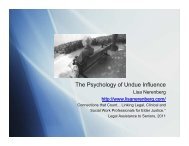Undue Influence: Definitions and Applications - California Courts ...
Undue Influence: Definitions and Applications - California Courts ...
Undue Influence: Definitions and Applications - California Courts ...
You also want an ePaper? Increase the reach of your titles
YUMPU automatically turns print PDFs into web optimized ePapers that Google loves.
goes back even further. Abraham Nievod (1992) describes a 1617 case in which Chancellor<br />
Francis Bacon found that a woman, known as Mrs. Death, had used undue influence to obtain a<br />
deed <strong>and</strong> will from “an old man about the age of eighty years <strong>and</strong> being weak of body <strong>and</strong><br />
underst<strong>and</strong>ing <strong>and</strong> having a great estate of goods <strong>and</strong> l<strong>and</strong>.”<br />
In determining if undue influence has occurred, courts, lawyers, <strong>and</strong> legal professionals<br />
look at many of the same factors described in the psychological literature. These include<br />
vulnerability that results from infirmity or diminished capacity, power differentials between the<br />
parties involved, the specific actions taken by influencers, <strong>and</strong> the harm that is produced. Perhaps<br />
the greatest difference between legal <strong>and</strong> psychological analyses <strong>and</strong> conceptualizations of undue<br />
influence is the legal system’s emphasis on evaluating specific transactions or decisions.<br />
Whereas the psychological literature focuses on patterns of conduct (e.g., relationships that are<br />
considered to be exploitative or artificially induced loyalties), legal discussions of undue<br />
influence typically focus on specific legal actions such as the signing of contracts, giving<br />
consent, or granting authority, <strong>and</strong> those actions or events leading up to the event in question.<br />
<strong>Courts</strong> look at subjects’ state of mind at the time documents were executed or decisions were<br />
made. The following sections describe how these factors have been addressed in the legal<br />
system.<br />
Imbalances in Power<br />
Just as psychologists recognize that certain individuals, by virtue of their knowledge,<br />
training, or relationships, wield power over others, the legal system recognizes that persons in<br />
“positions of trust <strong>and</strong> confidence” have an unfair advantage over those whose trust <strong>and</strong><br />
confidence they hold. It also imposes on them a duty to act in the others’ best interest. When<br />
undue influence is alleged, courts typically begin by establishing whether a relationship of trust<br />
<strong>and</strong> confidence exists, <strong>and</strong> hence, the duty.<br />
Positions of trust <strong>and</strong> confidence may be established by law or informally. The<br />
Restatement third of property (2003) §8.3 divides confidential relationships into three<br />
categories: fiduciary, reliant, <strong>and</strong> dominant-subservient (Welden-Smith, 2009). A fiduciary<br />
relationship is one in which the powerful person has a legal duty toward the other. The powerful<br />
person is called a fiduciary <strong>and</strong> the person to whom they owe the duty is called the “principal.”<br />
Professionals (<strong>and</strong> others) who are likely to have a fiduciary duty are trustees, conservators,<br />
98




